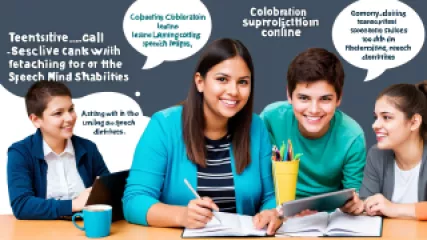15 Proven Strategies for Supporting Learners with Learning Disabilities Online
15 Proven Strategies for Supporting Learners with Learning Disabilities Online
In the digital age, where remote learning has become increasingly prevalent, supporting learners with learning disabilities in an online environment is crucial. As educators, parents, and caregivers, we must be equipped with a comprehensive understanding of the challenges these students face and the strategies that can empower them to succeed. In this comprehensive list roundup, we will explore 15 proven strategies for supporting learners with learning disabilities in the online learning landscape.
1. Establish Clear Expectations and Communication
Effective communication is the foundation of any successful online learning experience. Begin by clearly outlining the expectations, requirements, and deadlines for your online course or program. Provide students with a detailed syllabus, assignment guidelines, and instructions for navigating the virtual learning environment. Encourage open communication and regular check-ins to address any questions or concerns that may arise.
2. Utilize Assistive Technologies
Assistive technologies can be transformative for learners with learning disabilities. Explore and integrate a variety of tools, such as text-to-speech software, speech recognition programs, digital note-taking applications, and screen readers, into your online learning platform. Ensure that these tools are accessible and easy to navigate, providing comprehensive training and support for both students and educators.
3. Implement Multisensory Instructional Approaches
Learners with learning disabilities often thrive when presented with information through multiple sensory channels. Incorporate a variety of instructional methods, such as video lectures, interactive simulations, audio recordings, and visually engaging presentations, to cater to different learning styles. This multisensory approach can enhance comprehension, retention, and engagement among your students.
4. Provide Flexible Pacing and Timelines
Learners with learning disabilities may require additional time to process information and complete assignments. Offer flexible pacing and timelines, allowing students to work at their own pace and accommodate their individual needs. Consider implementing self-paced modules, extended deadlines, and the option to revisit or review course materials as needed.
5. Encourage Collaboration and Peer Support
Fostering a sense of community and collaboration can be particularly beneficial for learners with learning disabilities in an online setting. Facilitate opportunities for students to engage in group discussions, collaborative projects, and peer-to-peer tutoring. This not only supports learning but also helps build social skills and a sense of belonging.
6. Offer Personalized Feedback and Coaching
Individualized feedback and coaching can be instrumental in helping learners with learning disabilities overcome challenges and achieve their goals. Provide timely, constructive feedback on assignments and offer one-on-one coaching sessions to address specific learning needs. This personalized approach can boost confidence, motivation, and academic performance.
7. Incorporate Visual Organizers and Graphic Aids
Visual organizers, such as mind maps, concept diagrams, and graphic organizers, can be tremendously helpful for learners with learning disabilities. These tools can assist in breaking down complex information, highlighting key concepts, and facilitating better comprehension and retention of course material.
8. Offer Explicit Instruction and Step-by-Step Guidance
Learners with learning disabilities often benefit from explicit, step-by-step instruction and guidance. Break down tasks and concepts into manageable steps, providing clear explanations and demonstrations. Encourage students to apply what they have learned through hands-on activities, simulations, and real-world applications.
9. Implement Multimodal Assessment Strategies
Traditional assessment methods may not always accurately capture the knowledge and abilities of learners with learning disabilities. Explore a range of assessment strategies, including oral presentations, project-based evaluations, portfolio submissions, and alternative testing formats. This multimodal approach can provide a more comprehensive and equitable evaluation of student learning.
10. Foster Self-Advocacy and Self-Regulation Skills
Empowering learners with learning disabilities to develop self-advocacy and self-regulation skills is crucial for their long-term success. Encourage students to identify their strengths, weaknesses, and learning preferences, and provide them with the tools and strategies to effectively communicate their needs and advocate for the support they require.
11. Offer Opportunities for Breaks and Movement
Maintaining focus and engagement in an online learning environment can be particularly challenging for learners with learning disabilities. Incorporate regular breaks and opportunities for physical activity, such as virtual fitness sessions or brain breaks, to help students recharge and refocus their attention.
12. Provide Access to Counseling and Mental Health Support
Learning disabilities can often be accompanied by social, emotional, and mental health challenges. Ensure that your online learning platform offers access to counseling and mental health resources, such as virtual support groups, individual therapy sessions, and mindfulness practices, to support the overall well-being of your students.
13. Encourage Collaboration with Families and Caregivers
Families and caregivers play a crucial role in the success of learners with learning disabilities. Establish open communication channels, provide resources and training, and actively involve parents and guardians in the learning process. This collaborative approach can foster a supportive environment and enhance the effectiveness of online interventions.
14. Promote Inclusive and Diverse Representation
Ensuring that your online learning environment reflects the diversity of your student population is essential. Incorporate inclusive and diverse content, featuring individuals with learning disabilities and their stories of resilience and success. This representation can help challenge stereotypes, promote empathy, and foster a more inclusive learning community.
15. Continuously Evaluate and Refine Your Approach
Effective support for learners with learning disabilities in an online setting requires ongoing evaluation and refinement of your strategies. Regularly gather feedback from students, monitor their progress, and stay informed about the latest research and best practices in the field. Continuously adapt and evolve your approach to ensure that you are meeting the evolving needs of your learners.
By implementing these 15 proven strategies, you can create a more inclusive, engaging, and supportive online learning environment for learners with learning disabilities. Remember, each student is unique, and a personalized, multifaceted approach is essential for fostering their academic and personal growth. With dedication, creativity, and a deep understanding of their needs, you can empower these learners to thrive and reach their full potential in the digital age.






